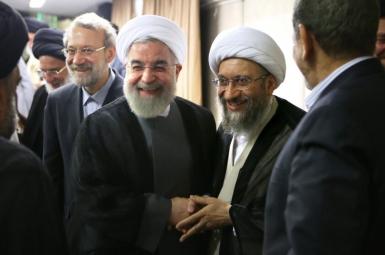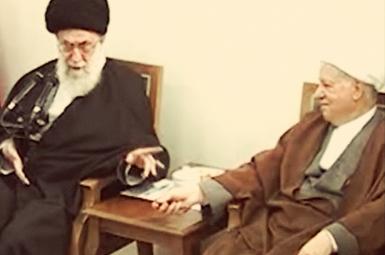
Commentary: The IRGC And The Language Of Missiles
Commentary by Morad Vaisibiame
Iran’s Revolutionary Guards (IRGC) say they have showcased an automatic missile system that can fire multiple missiles one after another. They chose the day when people were expecting the results of the United States presidential election.
It appears the event was timed to coincide with the hour when the winner was to be announced in America. However, the announcement of the final election results has been delayed.
But why today? And why showcase a missile system? The answer is largely clear, given the IRGC’s past behavior and the system of decision making in the Islamic Republic.
It appears that Ali Khamenei, Iran’s Supreme Leader and the IRGC commanders have concluded that Iran should flex its muscles by showcasing its missile capabilities regardless of who is the US next president. Khamenei micro-manages his armed forces, and putting on show ballistic missiles on the day after the US election cannot be an exception. Anti-US policy is the core of Khamenei’s strategy and showcasing this missile system emphasizes this strategy and its continuation.
The declared position of Khamenei and other senior Iranian leaders is that they do not care who wins the US election. The IRGC too wanted to convey this message by putting its missile system on display. The message is that the Islamic Republic speaks to the US in the language of missiles.
The IRGC’s missile capability and its Qods Force are the two tools Iran uses to further its challenges to America and its allies in the Middle East. In January, the United States killed Qasem Soleimani, the Qods Force commander, dealing a hard blow to the Qods Force, Iran’s proxy forces in the region, and Iran’s Middle East policies.
The Qods Force has been clearly weakened and its regional moves curbed. Meanwhile, the US has vowed to seriously react to any move by the Qods Force or by Iran’s proxy forces against US targets or those of its allies. This leaves only Iran’s missile power as a means of flexing muscles against the US.
The IRGC assumes that putting this missile system on display will send a strong message to the United States in the language of missiles. The reality is somewhat different.
The Islamic Republic’s current problems are not of the kind that can be solved by displaying or even test-firing missiles. Iran’s chaotic economic and social situation, the cutting of its oil revenue by US ‘maximum pressure,’ the crisis of coronavirus and the Iranian government’s incompetence in managing it, and the Iranians people’s dissatisfaction all give rise to the possibility of renewed nationwide protests. These would pose mainly economic or security problems, for which missile tests do not seem a solution.
The IRGC looks at challenges between Iran and the United States from a political-security perspective. Within this framework, the IRGC and Khamenei believe they need to stress their will to fight the US by displaying or even testing missiles.
Khamenei, his president, foreign minister and IRGC commanders all believe the US will continue its anti-Iranian policies no matter who is the next US president. But they deliberately ignore that Iran has also continued anti-US policies during the past four decades regardless of who was the US president.
Documented proof of this includes Khamenei’s opposition to the business activities and investments by US companies in the Iranian market after Iran’s 2015 nuclear deal with world powers. There was a desire to buy Boeing airliners, but this would not mean permission for a US company to enter Iran’s domestic market. Khamenei also made clear his opposition to a telephone conversation between President Hassan Rouhani and then President Barak Obama, and the IRGC’s missile tests immediately after the nuclear agreement with ‘Death to Israel’ inscribed on the missiles.
Morad Vaisi is an editor at Iran International Television and is considered an expert on Iran's IRGC and the Supreme Leader.








